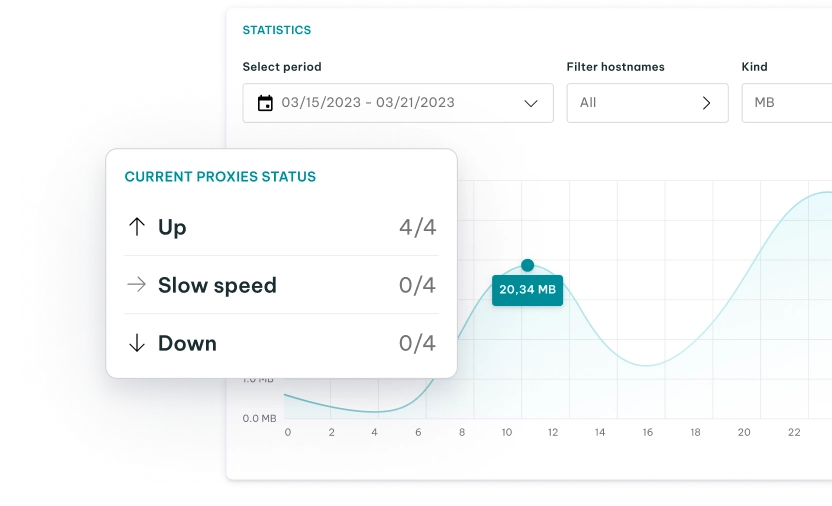What Is a Proxy Pool? Explained!
Proxy fundamentals

Justas Palekas
In the digital age where data flows like water, the concept of “pools” has taken on a whole new dimension. While most are familiar with the refreshing oasis of a real swimming pool, a parallel universe exists in the realm of technology known as “a proxy pool.”
But what is a proxy pool, and how does it work? While proxy pools are invaluable to those working with automation tools , they can also be useful to anyone using numerous proxies for optimal online anonymity.
So if you’re a proxy user, it’s great to understand these pools and how you will benefit from using them. For that reason, we’ll explain everything you need to know about proxy pools, and by the end of it, you shall know whether you need one.
What Is a Proxy Pool and How Does It Function?
To understand proxy pools, you first need to know what proxies are. We’re sure you already know this, but let’s remind you real quick.
Proxy servers are intermediaries between your internet-connected device and the internet. They have their own IP addresses which are shown as yours when using them. So basically, when you try to connect to a web server, the proxy shows its IP address as yours, keeping your actual IP hidden.
An individual proxy server has one unique IP address, so with five individual proxies, you’ll have five different IP addresses at your disposal. With proxy pools, this is different.
A proxy pool is a collection of multiple proxy servers with one entry point for each user. Instead of connecting directly to the target server, your requests go through one of the proxy servers in the pool, which then forwards the request and receives the response on your behalf.
The pool has a system responsible for the quality of proxies and the selection of IPs assigned to the specific user. This means that when you use the entry point to connect to the pool, the system will automatically assign a specific IP to your request.
No matter how big or small the proxy pool is, you’ll most likely get one entry point. However, the number of entry points can change depending on factors like session control and location.
So if you need to make hundreds or thousands of requests simultaneously, the proxy pool system will assign a different IP to each request on your behalf, thanks to the mechanism known as IP rotation.
The proxy rotation system enables users to get a new IP address from the pool whenever they make a web request or at a specific time interval. This depends on the dedicated residential proxy implemented by the proxy pool you use.
How Are Proxy Pools Created and Maintained?
Proxy providers create and maintain proxy pools to offer their clients a range of proxy servers for various purposes. The process involves acquiring, configuring, and managing proxy servers to ensure their availability, reliability, and performance.
IP addresses can be acquired through partnerships with internet service providers or by utilizing residential proxies. Most residential proxy providers get their IP addresses through P2P networks where real residential users agree to share their internet connection in exchange for some benefit. Premium providers, such as IPRoyal, use ethical and legal standards to obtain IP addresses.
The providers configure proxy software with settings such as port numbers, authentication methods, IP rotation intervals, and connection limits. They customize proxies based on client requirements, such as specifying proxy types (residential, mobile, or datacenter proxy pool), level of anonymity, and geographic locations.
Premium proxy providers continuously monitor the health and performance of their proxy servers in real-time. They employ automated monitoring tools to detect slow response times, downtime, or other issues. Automated IP rotation is also employed to change proxy IP addresses at specified intervals, preventing websites from blocking a single IP due to excessive requests.
To maintain the quality of the proxy pool, providers establish policies for retiring old proxies and introducing new ones. They rotate or replace IPs that exhibit performance degradation, connectivity issues, or have a history of abuse .
They also continuously assess the demand for proxy services and scale the pool as needed to accommodate increased traffic. Another thing they pay attention to is regular audits and optimization.
Routine audits are conducted to evaluate the effectiveness of the proxy pool. Based on audit findings, a provider can optimize configuration and practices to enhance overall performance and client satisfaction.
All this is required to create and maintain proxy pools that deliver reliable and high-quality proxy service to their customers.
What Are the Advantages of Using a Proxy Pool for Web Scraping, Automation, or Anonymity?
Using a proxy pool offers several advantages for various purposes, such as web scraping, automation, and anonymity. Here’s how a premium proxy pool can help in terms of:
- Web scraping
Proxy pools enable automatic rotation of IP addresses, helping you avoid detection and IP bans by websites that limit requests from a single IP address. Web scraping from a single IP address can lead to being blocked by websites. A proxy pool distributes requests across multiple IPs, reducing the risk of being blocked.
Proxy pools allow you to scale your web scraping efforts by distributing requests across many proxies, enabling faster data collection and IP rotation for scraping . They also provide proxies from various locations, enabling you to scrape data as if you were located in different regions, which is useful for gathering localized information.
- Automation
Proxy pools help distribute automated tasks across multiple proxies, preventing overload on any single server and improving the efficiency of your automated processes.
Also, using a proxy pool prevents IP-based rate limiting or restrictions imposed by services you’re automating, ensuring your tasks can run smoothly. In case a proxy server experiences issues, your automation tasks can automatically switch to another proxy in the pool, reducing downtime.
- Anonymity
Proxy pools mask your real IP address, providing an additional layer of privacy when browsing. On top of that, they also prevent websites and online services from tracking your actual location and bombarding you with targeted ads.
This anonymity allows you to access content that might be unavailable in your location by connecting through proxies in regions where the content is accessible. Using proxy pools can also help protect your data and online activities from potential threats, as your real IP address is hidden from malicious actors.
How Can a Proxy Pool Help Distribute Traffic and Improve Performance?
A proxy pool can help distribute traffic and improve performance by intelligently routing incoming requests to different proxy servers. This load-balancing mechanism ensures that no single proxy server becomes overloaded, leading to smoother and more efficient access to websites and online services.
Here’s how a proxy pool achieves this:
When multiple users or automated processes send requests to access websites or online services, the proxy pool acts as an intermediary. Instead of directing all requests to a single proxy server, the proxy pool distributes incoming requests across the available proxy servers.
By distributing traffic among different proxy servers, the proxy pool prevents any single server from being overwhelmed. This prevents congestion and ensures that each proxy server is used optimally, reducing the risk of performance degradation.
Are There Any Considerations or Limitations When Utilizing a Proxy Pool?
Using a proxy pool can be beneficial for both individuals and businesses. However, there are several considerations and limitations that you should be aware of.
Considerations
- The effectiveness of a proxy pool largely depends on the quality and diversity of the proxies within it. Ensure that the proxies come from reputable sources to avoid unreliable or malicious proxies.
- Proxies can provide a certain level of anonymity, but not all proxies offer the same level of privacy. Residential proxy pools from premium providers offer optimal anonymity and privacy.
- Using proxies to access websites or services can potentially violate their terms of use. Make sure to review the terms and conditions of the websites you are accessing to avoid legal issues.
- Some websites implement rate-limiting or IP-blocking mechanisms to prevent abuse. When using a proxy pool, you may encounter these limitations if multiple requests originate from the same IP address, leading to restricted access.
Limitations
- Proxy pools may not have proxies in all geographic locations. If your use case requires accessing content from specific regions, you might need to find geographically relevant proxies.
- Proxy pools often rotate IP addresses to distribute traffic and improve anonymity. However, this can also lead to inconsistent experiences when accessing websites that rely on session-based information.
- High-quality proxy services usually come from premium or paid providers, so avoid free proxies as these are less reliable and may carry security risks.
- If not properly managed, proxies could potentially expose sensitive data or be used as a point of entry by attackers.
To Sum Up
If you’re wondering “what is a proxy pool,” you’ve come to the right place. We got down to the nitty-gritty and created this article to inform you about proxy pools, their usage, functioning, and benefits.
If you’ve realized a proxy pool can be useful to you or your business, make sure you get it from a reliable, premium provider.
FAQ
How can one build or acquire a proxy pool?
Building free proxy pools should be easy for those who know how to write code for task automation. This involves finding multiple websites that provide free proxy lists, coding web scrapers that scrape the IPs and proxy ports from these lists, testing the proxies using an API to ensure they are still available, and pulling out the proxy servers from the database. The only option for non-coders is to use proxy pools developed by someone else.
Are all proxies in a proxy pool of the same quality or reliability?
No, proxies in a proxy pool are not necessarily of the same quality or reliability. For example, mixed proxy pools are made of different types of proxies, such as residential, mobile, and datacenter proxies. So, the residential IPs from the pool would provide higher reliability and performance.
What are some recommended proxy pool management practices to ensure optimal performance?
Some proxy pool management practices for optimal performance include ensuring proxy diversity, regular monitoring, implementing intelligent IP rotation algorithms, removing non-functional and slow proxies, and using load balancing techniques to distribute traffic evenly across proxies.


